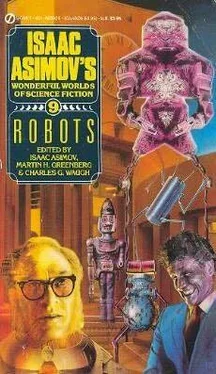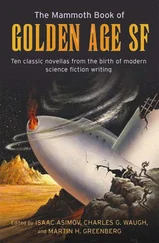Frederik Pohl - Isaac Asimov's Worlds of Science Fiction. Book 9 - Robots
Здесь есть возможность читать онлайн «Frederik Pohl - Isaac Asimov's Worlds of Science Fiction. Book 9 - Robots» весь текст электронной книги совершенно бесплатно (целиком полную версию без сокращений). В некоторых случаях можно слушать аудио, скачать через торрент в формате fb2 и присутствует краткое содержание. Год выпуска: 1989, ISBN: 1989, Издательство: Robinson Publishing, Жанр: Фантастика и фэнтези, на английском языке. Описание произведения, (предисловие) а так же отзывы посетителей доступны на портале библиотеки ЛибКат.
- Название:Isaac Asimov's Worlds of Science Fiction. Book 9: Robots
- Автор:
- Издательство:Robinson Publishing
- Жанр:
- Год:1989
- ISBN:ISBN: 1-85487-041-6
- Рейтинг книги:4 / 5. Голосов: 1
-
Избранное:Добавить в избранное
- Отзывы:
-
Ваша оценка:
- 80
- 1
- 2
- 3
- 4
- 5
Isaac Asimov's Worlds of Science Fiction. Book 9: Robots: краткое содержание, описание и аннотация
Предлагаем к чтению аннотацию, описание, краткое содержание или предисловие (зависит от того, что написал сам автор книги «Isaac Asimov's Worlds of Science Fiction. Book 9: Robots»). Если вы не нашли необходимую информацию о книге — напишите в комментариях, мы постараемся отыскать её.
Isaac Asimov's Worlds of Science Fiction. Book 9: Robots — читать онлайн бесплатно полную книгу (весь текст) целиком
Ниже представлен текст книги, разбитый по страницам. Система сохранения места последней прочитанной страницы, позволяет с удобством читать онлайн бесплатно книгу «Isaac Asimov's Worlds of Science Fiction. Book 9: Robots», без необходимости каждый раз заново искать на чём Вы остановились. Поставьте закладку, и сможете в любой момент перейти на страницу, на которой закончили чтение.
Интервал:
Закладка:
Cursing, they went to find out what it wanted. They found out. What it wanted was to laugh in their faces.
(The professor explained: "Indubitably, sadism is at work here, but harnessed in the service of humanity. Better a brutal and concentrated attack such as we have been witnessing than long-drawn-out torments." The class nodded respectfully.)
Mr. and Mrs. McCardle managed to pull themselves together for another try, and there was an exact repeat. Apparently the Toddler sensed something in the air.
"Three months," said George, with haunted eyes.
"You'll live," his wife snapped.
"May I ask just what kind of a crack that was supposed to be?"
"If the shoe fits, my good man-"
So a fine sex quarrel ended the day.
Within a week the house looked as if it had been liberated by a Mississippi National Guard division. George had lost ten pounds because he couldn't digest anything, not even if he seasoned his food with powdered Equanil instead of salt. Mrs. McCardle had gained fifteen pounds by nervous gobbling during the moments when the Toddler left her unoccupied. The picture window was boarded up. On George's salary, and with glaziers' wages what they were, he couldn't have it replaced twice a day.
Not unnaturally, he met his next-door neighbor, Jacques Truro, in a bar.
Truro was rye and soda, he was dry martini; otherwise they were identical.
"It's the little whimper first that gets me, when you know the big screaming's going to come next. I could jump out of my skin when I hear that whimper."
"Yeah. The waiting. Sometimes one second, sometimes five. I count."
"I forced myself to stop. I was throwing up."
"Yeah. Me too. And nervous diarrhea?"
"All the time. Between me and that goddam thing the house is awash. Cheers." They drank and shared hollow laughter.
"My stamp collection. Down the toilet."
"My fishing pole. Three clean breaks and peanut butter in the reel."
"One thing I'll never understand, Truro. What decided you two to have a baby?"
"Wait a minute, McCardle," Truro said. "Marguerite told me that you were going to have one, so she had to have one-"
They looked at each other in shared horror.
"Suckered," said McCardle in an awed voice.
"Women," breathed Truro.
They drank a grim toast and went home.
"It's beginning to talk," Mrs. McCardle said listlessly, sprawled in a chair, her hand in a box of chocolates. "Called me 'old pig-face' this afternoon." She did look somewhat piggish with fifteen superfluous pounds.
George put down his briefcase. It was loaded with work from the office which these days he was unable to get through in time. He had finally got the revised court-martial scene from Blount, and would now have to transmute it into readable prose, emending the author's stupid lapses of logic, illiterate blunders of language and raspingly ugly style.
"I'll wash up," he said.
"Don't use the toilet. Stopped up again."
"Bad?"
"He said he'd come back in the morning with an eight-man crew. Something about jacking up a corner of the house."
The Toddler toddled in with a bottle of bleach, made for the briefcase, and emptied the bleach into it before the exhausted man or woman could comprehend what was going on, let alone do anything about it.
George incredulously spread the pages of the court-martial scene on the gouged and battered coffee table. His eyes bulged as he watched the thousands of typed words vanishing before his eyes, turning pale and then white as the paper.
Blount kept no carbons. Keeping carbons caned for a minimal quantity of prudence and brains, but Blount was an author and so he kept no carbons. The court-martial scene, the product of six months' screaming, was gone.
The Toddler laughed gleefully.
George clenched his fists, closed his eyes and tried to ignore the roaring in his ears.
The Toddler began a whining chant:
"Da-dy's an au-thor!
Da-dy's an au-thor!"
"That did it!" George shrieked. He stalked to the door and flung it open.
"Where are you going?" Mrs. McCardle quavered.
"To the first doctor's office I find," said her husband in sudden icy calm. "There I will request a shot of D-Bal. When I have had a D-Bal shot, a breeding permit will be of no use whatever to us. Since a breeding permit will be useless, we need not qualify for one by being tortured for another eleven weeks by that obscene little monster, which we shall return to P. Q. P. in the morning. And unless it behaves, it will be returned in a basket, for them to reassemble at their leisure."
"I'm so glad," his wife sighed.
The Toddler said: "May I congratulate you on your decision. By voluntarily surrendering your right to breed, you are patriotically reducing the population pressure, a problem of great concern to His Majesty. We of the P. Q. P. wish to point out that your decision has been arrived at not through coercion but through education; i.e., by presenting you in the form of a Toddler with some of the arguments against parenthood."
"I didn't know you could talk that well," marveled Mrs. McCardle.
The Toddler said modestly: "I've been with the P. Q. P. from the very beginning, ma'am; I'm a veteran Toddler operator, I may say, working out of Room 4567 of the Empire State. And the improved model I'm working through has reduced the breakdown time an average thirty-five percent. I foresee a time, ma'am, when we experienced operators and ever-improved models will do the job in one day!"
The voice was fanatical.
Mrs. McCardle turned around in sudden vague apprehension. George had left for his D-Bal shot.
("And thus we see," said the professor to the seminar, "the genius of the insidious Dr. Wang in full flower." He snapped off the chronoscope. "The first boatloads of Chinese landed in California three generations-or should I say non-generations?-later, unopposed by the scanty, elderly population." He groomed his mandarin mustache and looked out for a moment over the great rice paddies of Central Park. It was spring; blue-clad women stooped patiently over the brown water, and the tender, bright-green shoots were just beginning to appear.
(The seminar students bowed and left for their next lecture, "The Hound Dog as Symbol of Juvenile Aggression in Ancient American Folk Song." It was all that remained of the reign of King Purvis I.)
Sally
by Isaac Asimov
Sally was coming down the lake road, so I waved to her and called her by name. I always liked to see Sally. I liked all of them, you understand, but Sally's the prettiest one of the lot. There just isn't any question about it.
She moved a little faster when I waved to her. Nothing undignified. She was never that. She moved just enough faster to show that she was glad to see me, too.
I turned to the man standing beside me. "That's Sally," I said.
He smiled at me and nodded.
Mrs. Hester had brought him in. She said, "This is Mr. Gellhorn, Jake. You remember he sent you the letter asking for an appointment."
That was just talk, really. I have a million things to do around the Farm, and one thing I just can't waste my time on is mail. That's why I have Mrs. Hester around. She lives pretty close by, she's good at attending to foolishness without running to me about it, and most of all, she likes Sally and the rest. Some people don't.
"Glad to see you, Mr. Gellhorn," I said.
"Raymond F. Gellhorn," he said, and gave me his hand, which I shook and gave back.
He was a largish fellow, half a head taller than I and wider, too. He was about half my age, thirtyish. He had black hair, plastered down slick, with a part in the middle, and a thin mustache, very neatly trimmed. His jawbones got big under his ears and made him look as if he had a slight case of mumps. On video he'd be a natural to play the villain, so I assumed he was a nice fellow. It goes to show that video can't be wrong all the time.
Читать дальшеИнтервал:
Закладка:
Похожие книги на «Isaac Asimov's Worlds of Science Fiction. Book 9: Robots»
Представляем Вашему вниманию похожие книги на «Isaac Asimov's Worlds of Science Fiction. Book 9: Robots» списком для выбора. Мы отобрали схожую по названию и смыслу литературу в надежде предоставить читателям больше вариантов отыскать новые, интересные, ещё непрочитанные произведения.
Обсуждение, отзывы о книге «Isaac Asimov's Worlds of Science Fiction. Book 9: Robots» и просто собственные мнения читателей. Оставьте ваши комментарии, напишите, что Вы думаете о произведении, его смысле или главных героях. Укажите что конкретно понравилось, а что нет, и почему Вы так считаете.









